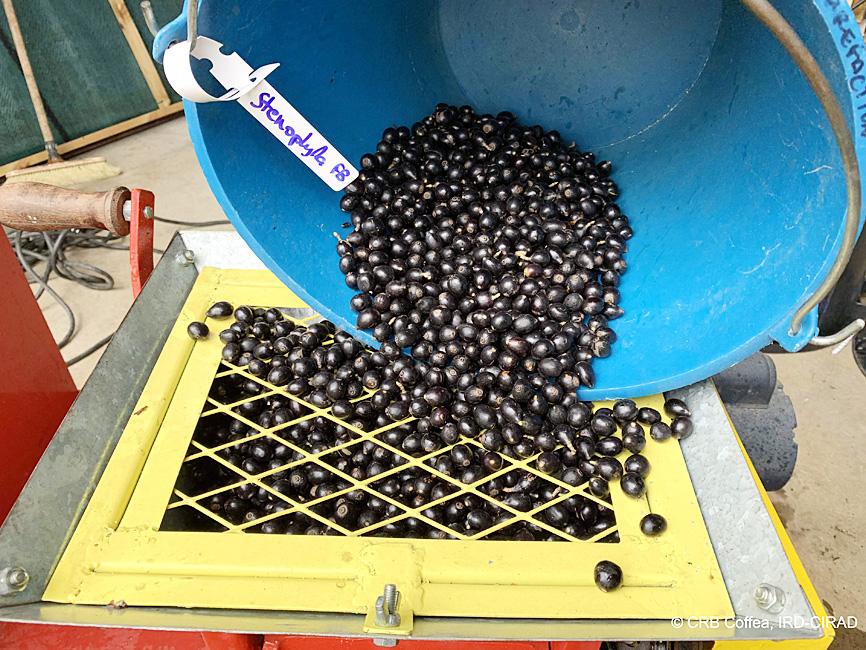A once-prized coffee species, rediscovered in West Africa decades after it was thought to have disappeared, is just as tasty as high-end Coffea arabica and more resilient to climate change, researchers said on Monday, adding that the forgotten bean could help future-proof quality coffee.
While there are more than 100 known coffee species, the world gets its caffeine hit mostly from the beans of just two — Coffea arabica, considered to be the superior brew, and the less-refined Coffea canephora, or Robusta, most commonly used for instant mixes.
Climate change presents a serious problem for the multibillion-dollar coffee industry and the about 100 million farmers worldwide who earn a living from cultivating the crop.

Photo: AFP / CRB Coffea, IRD-DIRAD
Arabica, which originates in the highlands of Ethiopia and South Sudan, is a cool tropical plant, preferring average annual temperatures of about 19°C.
The species is thought to be more vulnerable to global warming than Robusta, which can endure up to about 23°C.
However, the newly rediscovered Coffea stenophylla is known to tolerate conditions similar to Robusta, but with a higher average temperature of 24.9°C — more than 6°C higher than Arabica, a study in Nature Plants said.

Photo: Royal Botanical Gardens / AFP
To find a coffee species with both resilience and taste is “a once-in-a-lifetime scientific discovery,” said Royal Botanical Gardens, Kew coffee research head Aaron Davis, who led the research.
“This species could be essential for the future of high-quality coffee,” he added.
Reports from the 1800s and early 1900s considered Coffea stenophylla — endemic to Guinea, Sierra Leone and Ivory Coast — to be superior even to Arabica, its popularity spreading to cafes across France.
Coffea stenophylla fell out of use in the 20th century, vanishing completely from the record in 1954, until scientists finally found it growing in the wild in Sierra Leone in 2018 and set about studying its temperature tolerance — and its flavor.
Last year, they carried out a blind taste test with a jury of industry professionals from coffee brands Nespresso and Jacobs Douwe Egberts.
“The judges all found it different from what they know, with vegetal notes,” said Delphine Mieulet, scientist at the French Agricultural Research Center for International Development, which organized the tasting.
The new coffee had notes of “rose, elderflower, lychee — like the best Arabica,” she said, adding that the sample provided was so rare that not everyone was able to taste it.
Mieulet said she is confident that Coffea stenophylla would become commercially available, but that it might take several years.

ELECTION DISTRACTION? When attention shifted away from the fight against the militants to politics, losses and setbacks in the battlefield increased, an analyst said Recent clashes in Somalia’s semi-autonomous Jubaland region are alarming experts, exposing cracks in the country’s federal system and creating an opening for militant group al-Shabaab to gain ground. Following years of conflict, Somalia is a loose federation of five semi-autonomous member states — Puntland, Jubaland, Galmudug, Hirshabelle and South West — that maintain often fractious relations with the central government in the capital, Mogadishu. However, ahead of elections next year, Somalia has sought to assert control over its member states, which security analysts said has created gaps for al-Shabaab infiltration. Last week, two Somalian soldiers were killed in clashes between pro-government forces and

Ten cheetah cubs held in captivity since birth and destined for international wildlife trade markets have been rescued in Somaliland, a breakaway region of Somalia. They were all in stable condition despite all of them having been undernourished and limping due to being tied in captivity for months, said Laurie Marker, founder of the Cheetah Conservation Fund, which is caring for the cubs. One eight-month-old cub was unable to walk after been tied up for six months, while a five-month-old was “very malnourished [a bag of bones], with sores all over her body and full of botfly maggots which are under the

BRUSHED OFF: An ambassador to Australia previously said that Beijing does not see a reason to apologize for its naval exercises and military maneuvers in international areas China set off alarm bells in New Zealand when it dispatched powerful warships on unprecedented missions in the South Pacific without explanation, military documents showed. Beijing has spent years expanding its reach in the southern Pacific Ocean, courting island nations with new hospitals, freshly paved roads and generous offers of climate aid. However, these diplomatic efforts have increasingly been accompanied by more overt displays of military power. Three Chinese warships sailed the Tasman Sea between Australia and New Zealand in February, the first time such a task group had been sighted in those waters. “We have never seen vessels with this capability

‘NO INTEGRITY’: The chief judge expressed concern over how the sentence would be perceived given that military detention is believed to be easier than civilian prison A military court yesterday sentenced a New Zealand soldier to two years’ detention for attempting to spy for a foreign power. The soldier, whose name has been suppressed, admitted to attempted espionage, accessing a computer system for a dishonest purpose and knowingly possessing an objectionable publication. He was ordered into military detention at Burnham Military Camp near Christchurch and would be dismissed from the New Zealand Defence Force at the end of his sentence. His admission and its acceptance by the court marked the first spying conviction in New Zealand’s history. The soldier would be paid at half his previous rate until his dismissal